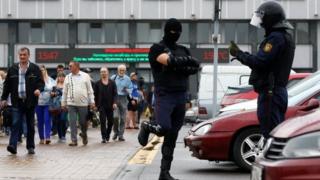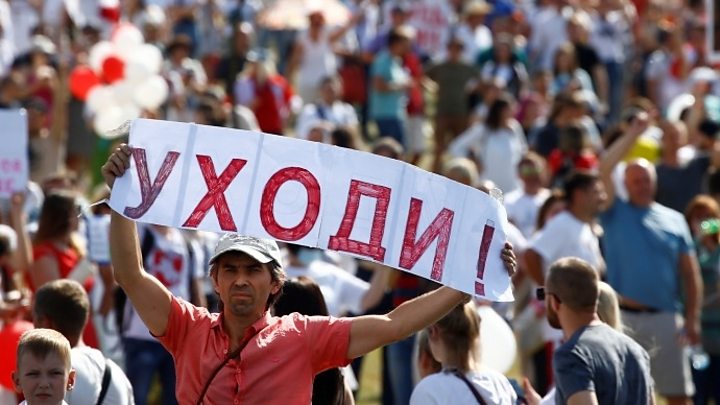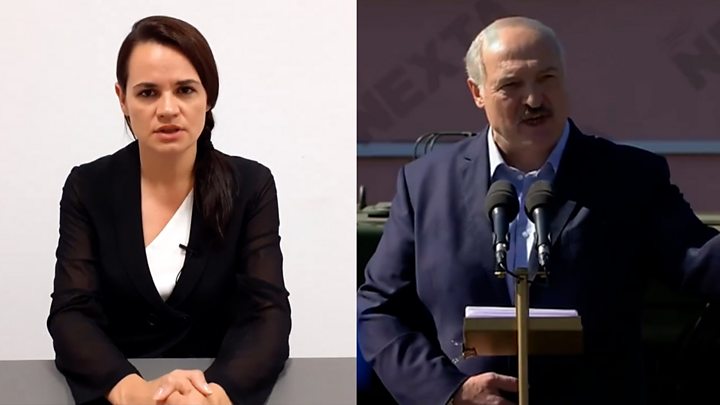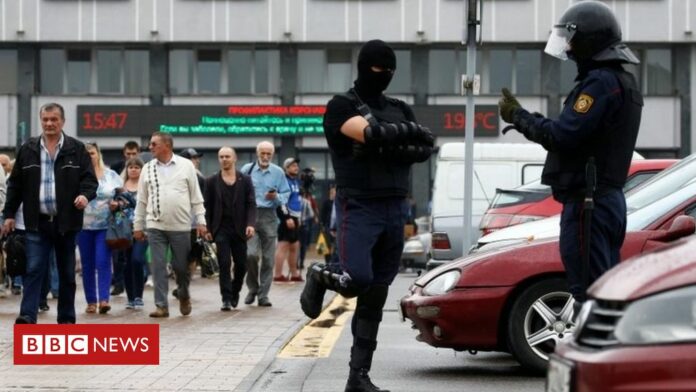
Image copyright
Reuters
Security forces were posted outside factories and plants on Wednesday
Belarusian President Alexander Lukashenko has stepped up efforts to reassert his control after 10 days of street protests and strikes triggered by disputed elections.
The official result gave him 80% of the vote but the opposition has denounced the poll as fraudulent.
Mr Lukashenko says he has given orders to end the unrest in the capital Minsk.
The move signalled an escalation just as European Union leaders held a virtual emergency summit on Belarus.
The President of the European Council, Charles Michel, made clear that the EU did not recognise the result of the election and called on Mr Lukashenko to release hundreds of protesters who have been imprisoned.
What action did Lukashenko order?
The man who has led Belarus since 1994 said he had ordered police to quell protests in Minsk. “There should no longer be any disorder in Minsk of any kind,” he told his security council.
“People are tired. People demand peace and quiet,” he added. He said he had ordered border controls to be tightened to prevent an influx of “fighters and arms”.
He also warned that workers at state media who had gone on strike in protest at the election and the subsequent crackdown on protests that they would not get their jobs back. Russian replacements have reportedly been brought in. Mr Lukashenko also accused those picketing outside factories of harassing workers.
He had earlier accused the opposition of “an attempt to seize power”.
Image copyright
EPA
Actors of the Kuplovsky theatre were among those who came out on strike
The BBC’s Jonah Fisher in Minsk said there had already been some signs this morning of a change in tactics from the Belarusian authorities in Minsk.
Our correspondent said that a checkpoint had appeared on the road leading to the state TV building with police checking the identity of anyone walking to the building. Strikes at factories around Minsk have also been obstructed by police.
Why the escalation?
Mr Lukashenko’s remarks came shortly after the exiled leader of the opposition, Svetlana Tikhanovskaya, had urged EU leaders to reject the election.
The 37-year-old, who left for Lithuania after being detained for hours following the vote, released a video statement on Wednesday.
She said President Lukashenko had “lost all legitimacy in the eyes of our nation and the world” and urged the EU to back what she called the “awakening of Belarus”.
She said: “People who went out to defend their vote in the streets of their cities all across Belarus were brutally beaten, imprisoned and tortured by the regime desperately clinging on to power. This is taking place right now in the middle of Europe.”
Ms Tikhanovskaya has formed a “co-ordination council” with plans for “new, fair and democratic presidential elections with international supervision”.
How has the EU responded?
After a three-hour video conference, EU Leaders agreed unanimously to take three actions over Belarus, BBC Europe Correspondent Gavin Lee reports:
- Firstly, to impose sanctions including asset freezes for an as yet undisclosed number of officials involved in alleged election-rigging, brutality and imprisonment of protesters. The exact sanctions are still being worked out
- Secondly, leaders agreed to a joint form of words making clear that the EU stands with the people on the streets, and does not recognise the result. But it does not go as far as stating they do not recognise President Lukashenko’s authority, as some EU officials wanted
- Thirdly, leaders offered help in trying to mediate dialogue between the government and the opposition, to find a way for the president to stand down and peacefully transfer power.
In addition, €53m (£48m; $63m) of financial support from the EU to Belarus is being re-assigned away from the state to non-governmental organisations, with some money assigned to help the victims of violence, as well setting up alternatives to government-backed media organisations.
German Chancellor Angela Merkel said election had been neither free nor fair.
Image copyright
EPA
Mrs Merkel said the EU would lend its support to civil society in Belarus
EU leaders, she added, condemned “the brutal violence against demonstrators as well as the imprisonment and use of violence against thousands of Belarusians” which followed in the wake of the disputed election.
She and European Commission President Ursula von der Leyen stressed the need for a dialogue between the authorities and the opposition in Belarus.

Media playback is unsupported on your device
On Saturday, Mr Lukashenko had said that Russian President Vladimir Putin had promised to provide assistance in the event of any external military threat.
But on Wednesday, Kremlin spokesman Dmitry Peskov said that there was no need for Russia to help Belarus militarily or otherwise at present.
Mrs Merkel said that “we’ve made it clear that military intervention by Russia would make the situation far more complicated”.
More about the protests in Belarus

Media playback is unsupported on your device






